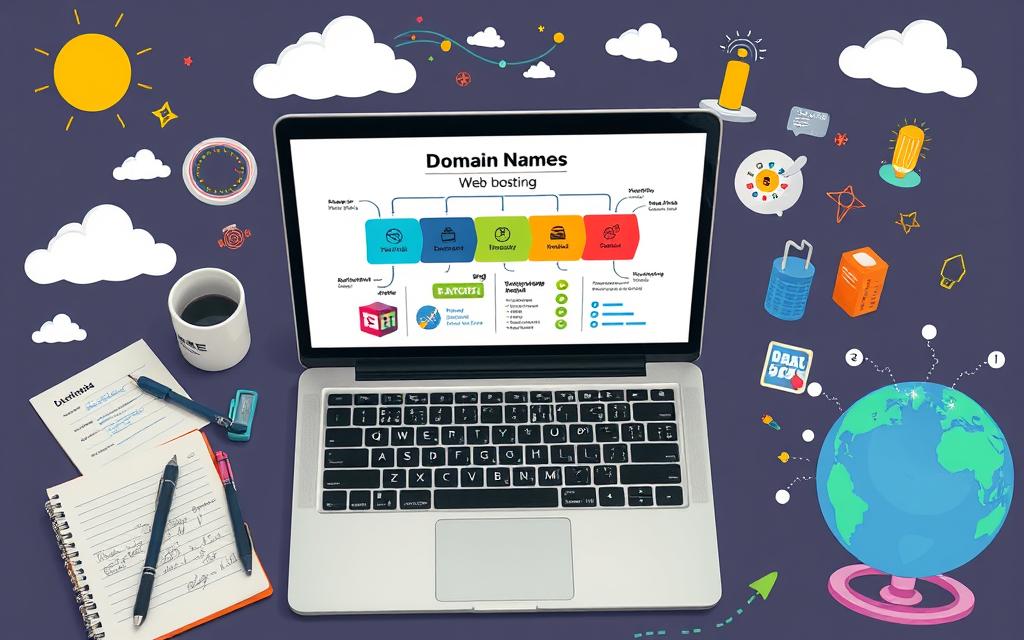In the digital realm, the selection of a domain name and hosting services is paramount for forging a robust online identity. This comprehensive guide will elucidate the critical factors involved in domain name selection and the pivotal elements of hosting services. Your domain name serves as the digital avatar of your brand, while hosting is the infrastructure that guarantees seamless website functionality. Grasping these concepts is essential for making decisions that bolster your business’s online visibility and user interaction.
Understanding the Importance of Domain Names
The establishment of an online presence necessitates a profound comprehension of domain names. The significance of domain names is paramount, as they constitute the quintessential identifier for your website. This simplifies the navigation for users to locate and recall your brand within the digital realm.
What is a Domain Name?
A domain name functions as the address users input into their browsers to access your website. It is comprised of two primary components: the actual name and the domain extension. Acquiring a thorough understanding of what constitutes a domain name is imperative for individuals aspiring to create a website or establish an online presence for their business. A judicious selection of a domain name can significantly elevate your brand’s identity and search engine visibility.
Types of Domain Names
Exploring the realm of domain names reveals a plethora of options to contemplate. Each category caters to distinct purposes and attracts specific audiences:
- Generic Domain Names: These are not affiliated with a specific country and frequently conclude with popular domain extensions such as .com, .net, or .org.
- Country-Code Domain Names: These domains are specific to a particular nation, exemplified by .us for the United States or .uk for the United Kingdom.
- Brandable Domain Names: These names are distinctive to a brand, facilitating enhanced recognition and memorability.
Choosing the Right Domain Extension
The selection of domain extensions is critical to your online strategy. Opting for the appropriate domain extension, such as .com, .org, or .info, can significantly influence your brand’s credibility and user trust. Although .com remains the most universally recognized extension, other types present unique opportunities to articulate your website’s purpose or geographical focus. A comprehensive understanding of the importance of domain names mandates meticulous deliberation of these extensions to augment your site’s allure and functionality.
The Basics of Web Hosting
Web hosting is pivotal in establishing an online presence, providing the necessary technologies and services for individuals and organizations to make their websites accessible on the internet. Grasping the fundamentals of web hosting is imperative for anyone aspiring to create a website. The plethora of options available necessitates a discerning choice of hosting service, as it significantly influences your site’s performance and user experience.
What is Web Hosting?
At its core, web hosting entails the storage of website files on a server that is connected to the internet. When users input your website’s URL, their browser retrieves the files from the server, enabling them to access your site. The selection of a web hosting service is critical, affecting not only your site’s speed but also its reliability. Several factors must be considered when choosing a hosting provider, including uptime, bandwidth, and security features.
Types of Hosting Services
Understanding the diverse hosting service types available is crucial for making an informed decision. Below is a comparative analysis of popular hosting services:
| Hosting Type | Best For | Advantages | Typical Cost |
|---|---|---|---|
| Shared Hosting | Beginners and Small Websites | Cost-effective, user-friendly | $2 – $10/month |
| VPS Hosting | Medium Businesses | More control, scalable resources | $20 – $100/month |
| Dedicated Hosting | Large Websites | Exclusive server resources, high performance | $80 – $500/month |
| Cloud Hosting | Websites with Variable Traffic | Scalable, reliable, pay-as-you-go | $10 – $300/month |
Exploring the hosting services types is essential to finding the right fit for your needs. Each type offers unique benefits, ensuring that you can choose one based on your specific requirements. This understanding can lay the groundwork for building a successful online presence.
Factors to Consider When Choosing Hosting Providers
The selection of an appropriate hosting provider necessitates a meticulous evaluation of several critical elements, which significantly influence your website’s operational efficacy and user engagement. The paramount importance of hosting reliability cannot be overstated, as any downtime can have a detrimental impact on your digital presence. The availability of customer support for web hosting is equally vital, as unforeseen issues may arise at any juncture, necessitating immediate assistance. Furthermore, the pricing structure of hosting services must be compatible with your financial constraints while providing the requisite functionalities for your online endeavors.
Reliability and Uptime
The correlation between hosting reliability and website uptime is unequivocal. Opt for providers that pledge a minimum of 99.9% uptime, as this percentage equates to virtually no downtime throughout the calendar year. A provider’s reputation for reliability is a testament to their commitment to ensuring your site’s accessibility, a critical factor for sustaining visitor traffic and enhancing credibility.
Customer Support Options
The significance of robust customer support for web hosting is often underestimated during the selection process. It is imperative to verify that the chosen provider offers comprehensive 24/7 support through diverse contact channels, including live chat, email, and telephone. The availability of prompt and proficient support can expedite issue resolution, thereby minimizing disruptions to your website’s functionality.
Pricing Structures
In assessing hosting pricing, it is essential to consider both the introductory offers and the long-term costs. Some providers may present attractive initial pricing, only to significantly increase renewal rates subsequently. A comparative analysis of features across various plans is necessary to identify the most cost-effective option. A thorough understanding of the economic implications of hosting choices ensures the selection of a provider that not only fits within your budget but also fulfills your website’s technical prerequisites.
The Relationship Between Domain Name and Hosting
The symbiotic relationship between your domain name and web hosting service is paramount for a robust online presence. This synergy revolves around user access to your website. Upon entering your domain name into a browser, users are redirected to the hosting server where your content resides. Therefore, grasping the interplay between domain and hosting is crucial for a website’s seamless operation and optimal performance.
How They Work Together
Your domain name acts as the gateway to your site, while hosting provides the server space for your website’s files. This synergy enables effortless user access, facilitating a direct connection to your content. When these elements are harmoniously aligned, site performance, visibility, and reliability are significantly enhanced. Such optimization leads to improved user experience, increased engagement, and higher traffic volumes.
Common Misconceptions
A prevalent misconception is that acquiring a domain name inherently includes hosting services. In fact, these are distinct services with unique functionalities. Securing a domain name grants you ownership of the web address but does not furnish the necessary infrastructure for hosting your content. Clarifying these misconceptions about domain hosting empowers you to make strategic decisions regarding your digital assets.

Setting Up Your Domain and Hosting
The inception of your website necessitates the establishment of domain and hosting with precision. Mastery over the domain registration guide is paramount to streamline this endeavor. This discourse aims to elucidate the process of domain registration and hosting, ensuring a seamless experience.
Step-by-Step Guide to Registration
Adherence to a meticulous methodology is imperative for the acquisition of a domain name. The ensuing domain registration guide delineates the necessary steps:
- Opt for a trustworthy domain registrar, such as GoDaddy, Namecheap, or Google Domains.
- Engage in a search for your preferred domain name, verifying its availability.
- Proceed to select your domain name and input the requisite registration information.
- Execute the payment to conclude the registration process.
- Monitor your domain registration particulars and renewal deadlines.
Connecting Your Domain to Hosting
Upon domain registration, the subsequent imperative is the integration with hosting. The subsequent steps delineate the procedure:
- Access your hosting account and locate the DNS settings section.
- Retrieve the nameservers from your hosting provider, accessible within your account dashboard.
- Return to your domain registrar and input the nameservers into the DNS settings.
- Allow a 24 to 48-hour window for DNS propagation, during which your domain will be linked to hosting.
Optimizing Your Domain and Hosting for SEO
In the current digital era, optimizing your domain for SEO is paramount. The decisions you make regarding your domain name and hosting can profoundly influence your search engine rankings. A judiciously selected domain name can significantly boost your brand’s visibility and search engine performance. Concurrently, the choice of hosting factors is crucial for ensuring a seamless user experience, thereby enhancing your SEO endeavors.
Importance of Domain Name for SEO
The domain name holds significant importance in SEO. A domain that is both relevant and optimized with keywords can lead to several benefits:
- Higher Search Visibility: Search engines often prioritize websites with keywords in their domains.
- Trust and Credibility: Users perceive a professional, relevant domain as more trustworthy.
- Branding Advantage: A memorable domain can strengthen your brand identity.
Hosting Factors That Affect SEO
Several hosting factors in SEO can either promote or hinder your search engine performance. These include:
- Server Location: Proximity of servers to your target audience can improve load times and SEO rankings.
- Website Speed: Faster websites offer better user experiences, which is a critical ranking factor.
- Uptime Reliability: Consistent uptime ensures your site remains accessible, which is crucial for maintaining rank.
In summary, understanding the domain name importance for SEO, coupled with a strategic approach to hosting choices, will help you build a robust online presence.

| Factor | Impact on SEO |
|---|---|
| Domain Name Quality | Enhances search visibility and brand trust |
| Server Location | Affects load times and local SEO rankings |
| Website Speed | Improves user experience, reduces bounce rates |
| Uptime Reliability | Ensures site availability, maintaining search rankings |
Future Trends in Domain Names and Hosting
The digital realm is undergoing a transformative phase, necessitating a keen awareness of forthcoming trends in domain names and hosting. As sectors evolve and expand, so do the avenues for creative branding and online visibility. Grasping these transformations is imperative for anyone aiming to bolster their digital footprint.
Emerging Domain Extensions
The advent of novel domain extensions such as .tech, .app, and specialized industry-specific options broadens the spectrum for domain name selection, aligning more closely with your brand’s identity. These emerging extensions not only facilitate bespoke branding but also tap into specific market segments, fostering more direct connections with your target demographic. By leveraging these options judiciously, you can significantly enhance your site’s visibility within the competitive digital arena.
Advancements in Hosting Technology
Concurrently, hosting technology is undergoing significant advancements, reshaping the paradigm for website performance. The proliferation of managed hosting solutions and AI-driven services heralds a new era of reliability and user-centric experiences. These innovations empower your website to achieve faster load times and robust security measures, thereby ensuring a seamless visitor experience. Staying current with these advancements is vital to ensure that your hosting infrastructure supports sustained growth and flexibility in the ever-changing digital environment.



